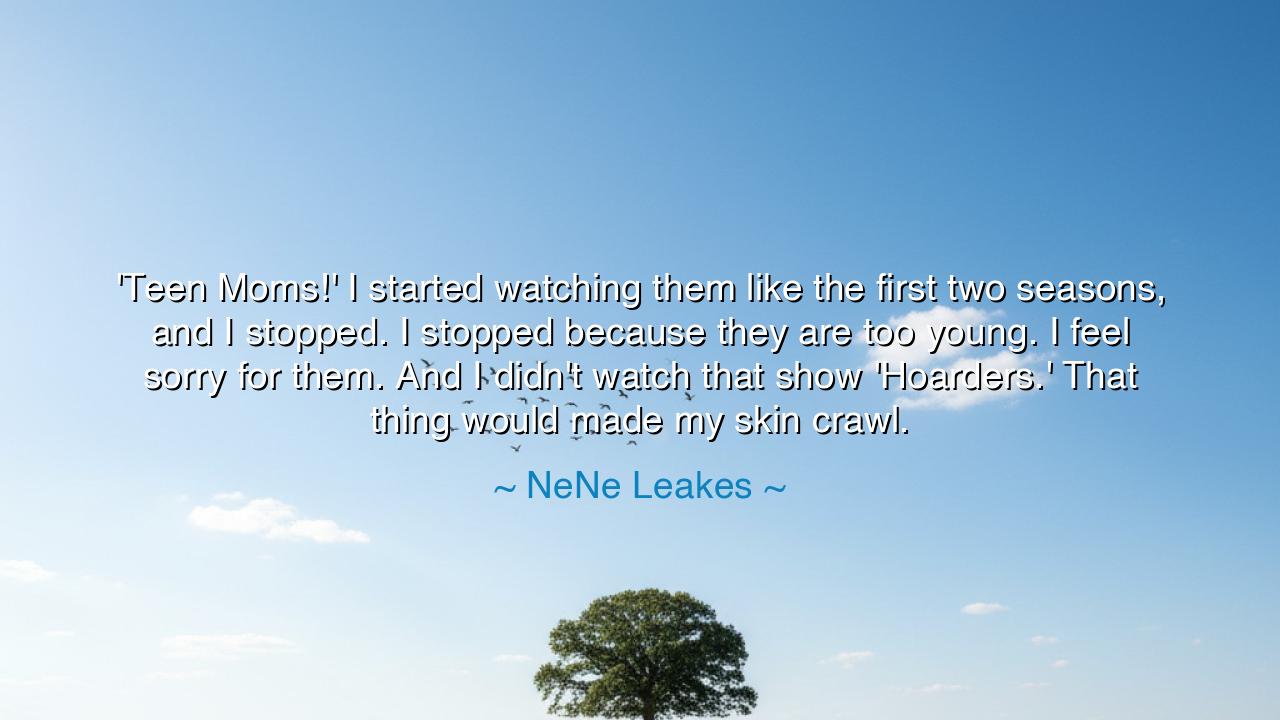
'Teen Moms!' I started watching them like the first two seasons
'Teen Moms!' I started watching them like the first two seasons, and I stopped. I stopped because they are too young. I feel sorry for them. And I didn't watch that show 'Hoarders.' That thing would made my skin crawl.






When NeNe Leakes confessed, “‘Teen Moms!’ I started watching them like the first two seasons, and I stopped. I stopped because they are too young. I feel sorry for them. And I didn't watch that show 'Hoarders.' That thing would make my skin crawl,” she revealed something deeper than a mere opinion about television. She revealed the instinctive recoil of the soul when it witnesses human struggle magnified on the public stage. Her words are not about entertainment alone, but about compassion and discomfort, about the uneasy line between storytelling and exploitation.
The origin of this reflection lies in the rise of reality television, a genre designed to expose human lives in their rawest form. Shows such as “Teen Moms” turn the intimate struggles of youth—pregnancy, responsibility, poverty—into spectacle. Leakes admits she first watched, drawn by curiosity, but later stopped, not out of boredom, but because of pity. She saw that those on screen were “too young,” burdened with trials far beyond their years. To her, their pain was not entertainment—it was sorrow.
History shows us that this tension between spectacle and compassion is ancient. In the Roman coliseum, men once cheered as gladiators fought to the death. Yet there were also voices, like the philosopher Seneca, who decried such games as corrupting to the spirit, for they turned suffering into amusement. Just as Seneca urged his peers to turn away from bloodshed disguised as sport, so too did NeNe Leakes turn away from shows that made her heart ache. She recognized that true entertainment must not come at the cost of another’s dignity.
Her rejection of “Hoarders” further illustrates this principle. She calls it something that would make her “skin crawl.” For in watching the overwhelming chaos of people buried under possessions, she saw not humor, but pathology. The discomfort is telling: it is the natural human reaction when one’s compassion outweighs curiosity. What to some may appear as fascinating television, to her was an invasion of suffering too raw to be consumed.
The deeper meaning here is that not all stories are meant to be consumed as spectacle. There is a difference between understanding another’s struggle with empathy and turning it into amusement. To witness is one thing; to indulge in the voyeurism of pain is another. Leakes’ words remind us that our hearts must be guardians, discerning what we take in. For what we watch, we feed upon, and if we feast upon sorrow without compassion, our spirits grow hardened.
The lesson for future generations is clear: do not confuse the pain of others with entertainment. Respect the weight of their suffering, especially when it falls upon the young or the vulnerable. If a story troubles your soul, listen to that instinct—it is a warning that you are seeing something that should be treated with compassion, not consumption. To turn away is not weakness, but wisdom.
Practical counsel flows: when confronted with media that showcases hardship, ask yourself—Am I watching to understand, to empathize, to grow? Or am I watching to be amused by another’s sorrow? If the latter, turn away. Instead, choose stories that inspire, that uplift, that deepen your humanity. And when you encounter those who are truly suffering, offer help, not judgment.
Thus let NeNe Leakes’ words endure as a teaching: not all that is shown deserves to be watched. Guard your eyes and your heart, for they shape your soul. Where there is sorrow, choose empathy. Where there is suffering, choose compassion. And where the world invites you to consume pain as laughter or spectacle, be strong enough to walk away.






AAdministratorAdministrator
Welcome, honored guests. Please leave a comment, we will respond soon